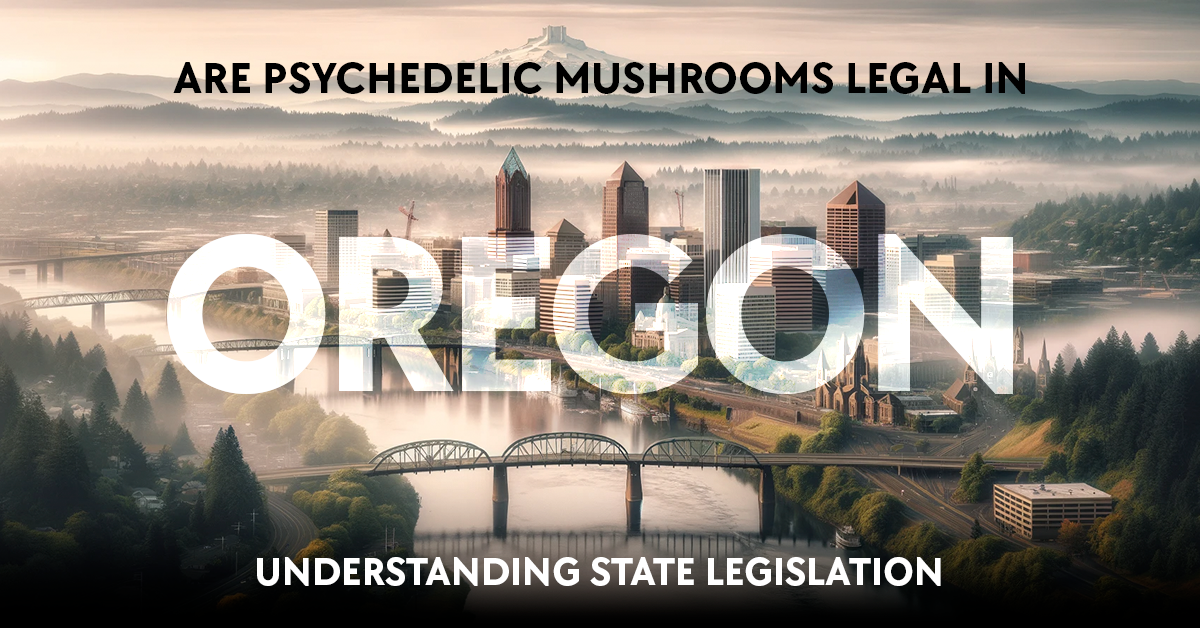Psychedelic mushrooms, also known as psilocybin mushrooms, have long been a contentious topic due to their psychoactive properties. Oregon has taken a pioneering step by altering the legal status of these substances. As of now, under Measure 109, passed in November 2020, Oregon has become the first state in the United States to legalize the use of psilocybin, the psychoactive compound found in certain species of mushrooms, for therapeutic use in a controlled setting under the supervision of licensed facilitators.

It’s important to understand what this change entails. While Oregon’s law represents a shift towards more progressive drug policies, it is not a blanket legalization for all uses. The implementation is specific to therapeutic contexts, and the Oregon Health Authority is responsible for the establishment of a program that regulates the manufacturing, delivery, and administration of psilocybin at service centers. Recreational use, personal cultivation, and unregulated possession outside of the sanctioned service centers remain illegal.
Navigating the new regulations can be complex, and if you’re considering psilocybin for therapeutic purposes, a clear understanding of the legal framework is essential. The law also established the Oregon Psilocybin Advisory Board, tasked with advising on the regulatory aspects of the new program. This legislation represents a significant departure from traditional drug laws, aiming to offer a regulated framework for the potential benefits of psilocybin while maintaining strict guidelines to address safety and public health concerns.
Legal Status of Psychedelic Mushrooms in Oregon
Table of Contents
https://www.youtube.com/watch?v=UAvLWjpcb2Q&embed=true
In Oregon, recent legislation has altered the legal status of psychedelic mushrooms, making the state a forerunner in psilocybin reform.
Historical Context: Decriminalization and Legalization Efforts
Oregon has a history of progressive drug policy reform. Decriminalization efforts gained substantial momentum when you, as a voter in Oregon, decriminalized the possession of small amounts of drugs, including psychedelic mushrooms, through the passing of ballot measures. These initiatives set the stage for further discussions about the role of substances like psilocybin in therapeutic settings.
Measure 109: Passage and Implications
Measure 109 was a significant milestone, receiving approval through a public vote that demonstrated your support for the therapeutic use of psychedelic mushrooms. This measure does not permit the unregulated use of psilocybin; instead, it establishes a licensed system where you can access psilocybin services under supervised settings. The legalization under Measure 109 doesn’t equate to a retail market but signals a shift in understanding psilocybin’s potential benefits.
Regulations Governing Psilocybin Services

Oregon has established a regulatory framework for the legal provision of psilocybin services. Your understanding of these regulations will help ensure compliance with state laws.
Role of Oregon Health Authority
The Oregon Health Authority (OHA) oversees the implementation of psilocybin regulations. As a facilitator or service center operator, you must follow OHA’s guidelines, which include the development and application of standards for safe and effective psilocybin services. This authority is also responsible for public outreach and education about psilocybin programs.
Licensing Requirements for Service Centers
To operate a licensed psilocybin service center in Oregon, your center must meet specific licensure requirements. These requirements include, but are not limited to, providing a safe environment that meets the standards set for the administration of psilocybin. Each center must obtain a license from OHA that confirms compliance with state regulations.
Guidelines for Facilitators and Therapists
As a psilocybin facilitator or therapist, you must be licensed through the OHA as well. This license ensures that you have the required training to safely guide individuals through psilocybin experiences. The regulatory framework mandates that facilitators and therapists must follow ethical guidelines and provide professional, client-focused care during psilocybin sessions.
Access to Psilocybin Services

In Oregon, the Oregon Psilocybin Services Act has paved the way for a regulated framework, allowing adults to access psilocybin services through established service centers after a comprehensive screening and preparation process.
Establishing Psilocybin Service Centers
To provide psychotherapy with psilocybin, also known as magic mushrooms, specific regulations have been set for establishing service centers. Each center needs to meet state guidelines, ensuring that facilities are designed to offer a safe therapeutic environment. The therapists and staff are required to undergo training and certification, to be able to facilitate sessions effectively and provide professional care.
Client Eligibility and Process
Before you can access psilocybin services, you must undergo a thorough screening to determine your eligibility. This process is crucial to ensure that psilocybin therapy is suitable for your needs. Upon meeting the criteria, you are guided through a preparation session, where a certified psychotherapist will discuss your intentions and any concerns, as well as explain the process ahead.
Sessions Framework: Preparation, Administration, and Integration
The psilocybin therapy in Oregon consists of three distinct phases:
- Preparation Session: Before the actual administration of psilocybin, you attend a preparation session to build a therapeutic relationship with your therapist and set intentions for the experience.
- Administration Session: During your administration session, psilocybin is provided in a controlled, monitored setting, with a therapist present to support throughout the experience.
- Integration Session: Following the experience, you engage in an integration session to process and interpret your experiences, which can be pivotal for therapeutic outcomes.
Each stage is designed to ensure safe and beneficial access to psychedelic mushrooms under professional guidance, enhancing the potentially positive effects of the therapy.
Health Benefits and Therapeutic Uses

Oregon has pioneered in acknowledging the potential therapeutic effects of psychedelic mushrooms. Particularly, psilocybin—the active compound—has been a focal point for mental health treatments and scientific research.
Mental Health Treatments: Depression, Anxiety, and PTSD
Recent studies show that psilocybin has significant promise in treating conditions such as depression, anxiety, and PTSD. In Oregon, the clinical use of psilocybin for these conditions is now a possibility, marking an important step in mental health therapy. Patients dealing with end-of-life anxiety have also found relief through psilocybin therapy, experiencing a reduction in distress surrounding mortality.
Comparison with Traditional Pharmaceuticals
Psilocybin therapy offers a novel approach compared to traditional pharmaceuticals. For conditions like treatment-resistant depression, psilocybin has shown rapid and sustained symptom improvement, distinguishing itself from typical antidepressants that often take weeks to show effects and may come with more side effects.
Ongoing Research and Clinical Trials
Research into psilocybin continues to expand with clinical trials probing its efficacy and safety. With Oregon’s law changes, formal studies can more readily explore how psilocybin can be integrated into therapeutic settings and potentially transform mental health treatment paradigms.
Economic and Social Considerations
In Oregon, the legalization of psychedelic mushrooms brings economic and social considerations that you should be aware of. These considerations involve how costs might shape accessibility, the role of insurance in this new market, and the potential impact on local businesses and market growth related to psilocybin products.
Cost and Affordability for Clients
Psilocybin therapies might represent a significant expense. Your costs could vary widely depending on the type of treatment and the length of sessions required. It’s essential to understand that affordability for Oregonians seeking psilocybin sessions may impact the uptake and reach of these services.
Insurance Coverage and Financial Assistance
As it stands, insurance coverage for psilocybin therapy isn’t broadly established. However, financial assistance programs may emerge as the market matures, potentially increasing accessibility. You should keep an eye on evolving policies that might affect how insurance companies address these services.
Impact on Local Businesses and Market Growth
Legalization can spur the creation of businesses involved in the manufacturing and sale of psychedelic mushrooms. Oregon’s market growth for psilocybin products could have a ripple effect on related sectors, potentially benefiting local economies. Yet, the actual extent of this impact will be observed as the industry develops and stabilizes.
Comparative Legal Framework
As you explore the legal landscape surrounding psychedelic mushrooms, it’s critical to understand how Oregon’s approach compares to other regions. This comparison illuminates the varying degree of legal acceptance and the diversity of regulatory frameworks in place.
Drug Policies in Other States and Countries
Specifically, Oregon has established a regulated framework for psilocybin through Measure 109, recognizing its potential for therapeutic use. Unlike Oregon, where decriminalization includes a medical model, in the Netherlands, you’ll find truffles containing psilocybin are sold legally in smart shops, reflecting a more permissive stance.
Psychedelics Decriminalization: Colorado and Washington
In comparison, Colorado and Washington have both taken steps to change how they handle psychedelics. Denver, Colorado became the first city to decriminalize psilocybin mushrooms, signaling a shift towards more progressive drug policies. Meanwhile, a broader initiative in Washington D.C. has led to the deprioritization of law enforcement actions against psychedelic plants and fungi.
Global Psychedelics Movement
The global movement recognizes psychedelics, such as those decriminalized in Oregon, as Schedule I substances under federal law while various countries and states enact their own policies. For instance, several countries, including Portugal and the Czech Republic, have decriminalized possession of small amounts of drugs, including psychedelics, for personal use.
Community and Cultural Impact
In Oregon, the legalization of psychedelic mushrooms, specifically psilocybin, under Measure 109 has had particular cultural and community implications. You’ll discover how this shift in policy has influenced public opinion, social equity endeavors, educational outreach, and sustainability efforts within the state.
Public Opinion and Social Equity Initiatives
In general, Oregonians have shown a progressive stance towards psychedelic mushrooms, with an increasing public opinion that favors the therapeutic and personal use of these substances. This is evidenced by the passing of Measure 109, which legalizes the regulated medical use of psilocybin. Notably, there have been concerted efforts to ensure that the legalization includes social equity initiatives, addressing the negative impacts that prior drug laws have had on marginalized communities. The aim is to provide equitable access and to prevent a disproportionate burden resting on any single group, particularly those who have historically faced legal and societal penalties in the context of drug use.
For instance, policies are in place ensuring that those from previously criminalized demographics are able to participate in the new legal psilocybin market. This includes measures like:
- Lowering barriers for entry into the psilocybin service industry
- Providing support for minority-owned businesses
Educational Outreach and Community Programs
The legalization has brought with it a surge in educational outreach and community programs. Organizations and nonprofits are actively involved in offering educational resources to Oregonians about the safe, responsible, and therapeutic use of psilocybin. These programs are crucial in building an informed community that understands both the potential benefits and risks.
Key components of these educational efforts include:
- Workshops and seminars
- Distribution of educational materials
- Training programs for psilocybin service facilitators
Environmental and Sustainability Considerations
With the growing interest in psilocybin mushrooms, there’s an increased focus on environmental sustainability and the ecological implications of mushroom cultivation. Sustainable cultivation practices are being emphasized to ensure that an increased demand does not harm local ecosystems or lead to overharvesting of wild psilocybin species, which could impact biodiversity.
Oregon’s approach includes:
- Encouraging the cultivation of psilocybin mushrooms with minimal ecological footprint
- Research into sustainable farming methods
Through Measure 109, Oregon has not only pioneered the decriminalization of certain substances but has also provided a framework that prioritizes community well-being, social equity, and environmental responsibility.
Frequently Asked Questions
In Oregon, the legality of psychedelic mushrooms, specifically psilocybin, is subject to strict state regulations, particularly after recent legislative reforms. Here’s what you need to know.
What are the regulations surrounding the use of psilocybin in therapeutic settings in Oregon?
Oregon has established a program for the legal use of psilocybin in therapeutic settings. You must adhere to guidelines set forth by the Oregon Health Authority, which oversees and implements the regulatory framework for this controlled use.
Can individuals grow psilocybin mushrooms for personal use in Oregon?
Personal cultivation of psilocybin mushrooms for non-commercial use remains illegal in Oregon. Such activity can lead to legal consequences unless it falls within state-sanctioned guidelines and purposes.
What are the potential legal consequences of possessing psychedelic mushrooms outside of sanctioned use in Oregon?
Possession of psychedelic mushrooms outside of the legal framework can attract serious legal consequences, which can range from fines to imprisonment, depending on the quantity and intention behind possession.
Are there any specific cities or counties in Oregon with different laws regarding psychedelic mushrooms?
While Oregon state law provides a uniform framework for the decriminalization and medical use of psilocybin, certain cities or counties may have local regulations and law enforcement priorities that differ.
How does Oregon’s approach to psychedelic mushroom legality compare to federal laws?
Oregon’s decriminalization and regulation of psilocybin for therapeutic use conflicts with federal law, which classifies psilocybin as a Schedule I substance, making it illegal to possess, use, or distribute.
What are the age restrictions for participating in psilocybin therapy programs within Oregon?
You must be at least 21 years of age to participate in psilocybin therapy programs in Oregon. This age limit is part of the regulatory measures to ensure the controlled administration of psilocybin.







